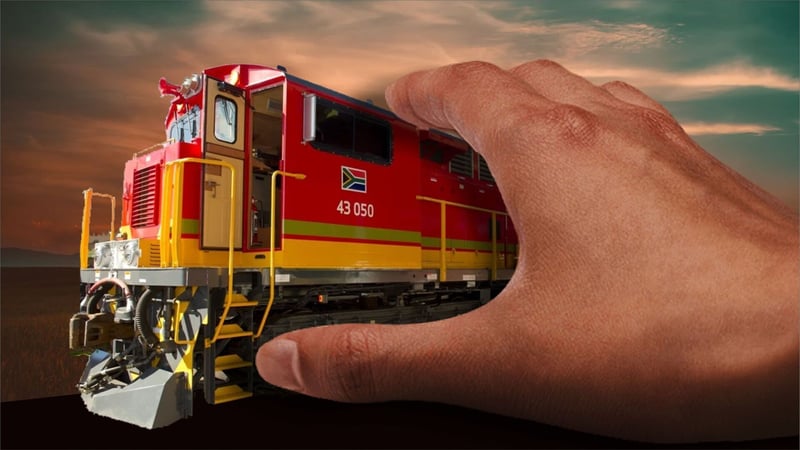Saving South Africa’s Rail Network
Written by: Mitch Mitchell Save to Instapaper
South Africa's rail network stands on the brink of crisis due to the urgent and rampant issue of cable theft. The importance of this rail system cannot be overstated, as it serves as the lifeblood of the nation's economy, connecting industries, facilitating trade, and ensuring the efficient movement of goods. However, the relentless theft of cables, primarily driven by the lucrative scrap metal market, has plunged the rail infrastructure into chaos. For example, 1,200 km of rail power cable was stolen in 2022. This crisis not only disrupts essential transportation services but also jeopardizes the livelihoods of countless individuals dependent on the reliable functioning of the rail network.
The devastating effects of cable theft reverberate far beyond mere inconvenience. This criminal activity not only causes widespread service delays but also poses a severe threat to public safety. With essential signaling and power cables being stolen, the risk of accidents and derailments skyrockets, putting the lives of passengers and rail workers on the line. The economic toll is equally alarming, with businesses facing unprecedented disruptions and financial losses. Urgent and decisive action is imperative to curb this crisis, safeguard the integrity of the rail network, and protect the economic lifeline that South Africa's railways represent.
The major problem with copper is that once stolen, copper ownership-and therefore proof of theft – is impossible to establish. This results in only 7% of apprehended cables thieves being effectively prosecuted.
If copper could be made identifiable, it would have a transformative impact on curbing the issue of cable theft. The implementation of identifiable copper would act as a powerful deterrent, significantly reducing the incentive for criminals to target these cables in the first place.
One of the immediate benefits would be a decline in the frequency and scale of cable theft incidents, leading to increased reliability and functionality of critical infrastructure like South Africa's rail network. This, in turn, would alleviate the economic burden caused by service disruptions, minimizing financial losses for businesses and preventing the potential life-threatening consequences associated with theft-related accidents on railways.
CableDNA offers precisely this solution: permanent and indelible identification of copper. This method withstands attempts to burn, granulate, or melt the copper into ingots. The application of this technology to rail cables ensures a lasting identification, significantly increasing the likelihood of successful prosecution. As a result, engaging in theft, whether for individual thieves, organized syndicates, or scrapyards, becomes an exceptionally high-risk endeavor. The implementation of this identification method not only acts as a powerful deterrent but also strengthens the legal consequences for those involved in the illicit trade of stolen copper.
A robust and secure rail network is paramount for South Africa's economic development and overall stability. A functional rail network not only facilitates the timely delivery of essential commodities but also minimizes road congestion, reducing the wear and tear on highways and decreasing carbon emissions. In this context, safeguarding the rail network from cable theft is imperative. The pervasive issue of cable theft disrupts the smooth operation of the rail system, leading to service delays, financial losses, and safety hazards. Ensuring the resilience of the rail network is crucial for sustaining economic growth, creating employment opportunities, and maintaining a reliable means of transporting goods and people.
Moreover, an effective and protected rail network is vital for enhancing connectivity and regional integration within South Africa. The country's vast and varied landscapes demand a dependable transportation system to connect urban and rural areas, fostering economic inclusivity and reducing regional disparities.
A secure rail network also plays a crucial role in promoting tourism by providing a safe and efficient means of travel for both domestic and international visitors. By addressing the menace of cable theft, South Africa can reinforce its commitment to sustainable development, environmental conservation, and improved accessibility, all of which contribute to the nation's long-term prosperity.
Get new press articles by email
CableDNA offers the indelible and permanent identification of copper and copper cables to make copper to risky to steal, buy or sell.
Latest from
- Fos4is Drops New Music Video “Different” – Because Real Change Isn’t Instant Coffee
- Fos4is Music Declares - “No Court!” – A Holy Rebellion Against Spiritual Red Tape
- “Vier en veertig” - Wanneer Liefde Oud Word Maar Nie Koud Nie
- Fos4is Drops “Egyptian cotton” Divine Heat in New Music Video “Egyptian Cotton”
- Fos4is Drops “Soy boy” Music Video - A Satirical Symphony for the Spine-Deprived
- Fos4is Debuts Retro-Splashed Music Video “70s life” - Bell Bottoms, Afros, and Existential Angst Never Looked So Good
- Fos4is Drops Electrifying Satire - "It’s Not Right Umbane" Shocks the nation (but not the politicians)
- Fos4is drop 'n gospel-banger met 'n glimlag en ‘n beat
- “Beyond belief” Music Video Drops — And it’s a Holy Roller Coaster
- Fos4is Unleashes Bold New Music Video Exposing The “Watchful Dragons” of the Mind
- Fos4is Music Releases Powerful New Music Video - "Beyond" – A Visual Journey of Surrender, Faith, and Transformation
- Fos4is Releases Cool New Music Video - "Before It Breaks" – A Bold Statement of Faith In The Now
- Fos4is Drops Chill New Music Video - Just Livin’ — a Celebration of living life in God's Amazing Grace
- New release - Fos4is Unveils “Echoes” – A Journey of Waiting, Grace, and Destiny
- After the Rain - Fos4is launches an emotional new music video
The Pulse Latest Articles
- Education Is The Frontline Of Inequality, Business Must Show Up (December 11, 2025)
- When The Purple Profile Pictures Fade, The Real Work Begins (December 11, 2025)
- Dear Santa, Please Skip The Socks This Year (December 10, 2025)
- Brandtech+ Has 100 Global Creative Roles For South African Talent (December 9, 2025)
- The Woman Behind Bertie: Michelle’s Journey To Cape Town’s Beloved Mobile Café (December 9, 2025)
